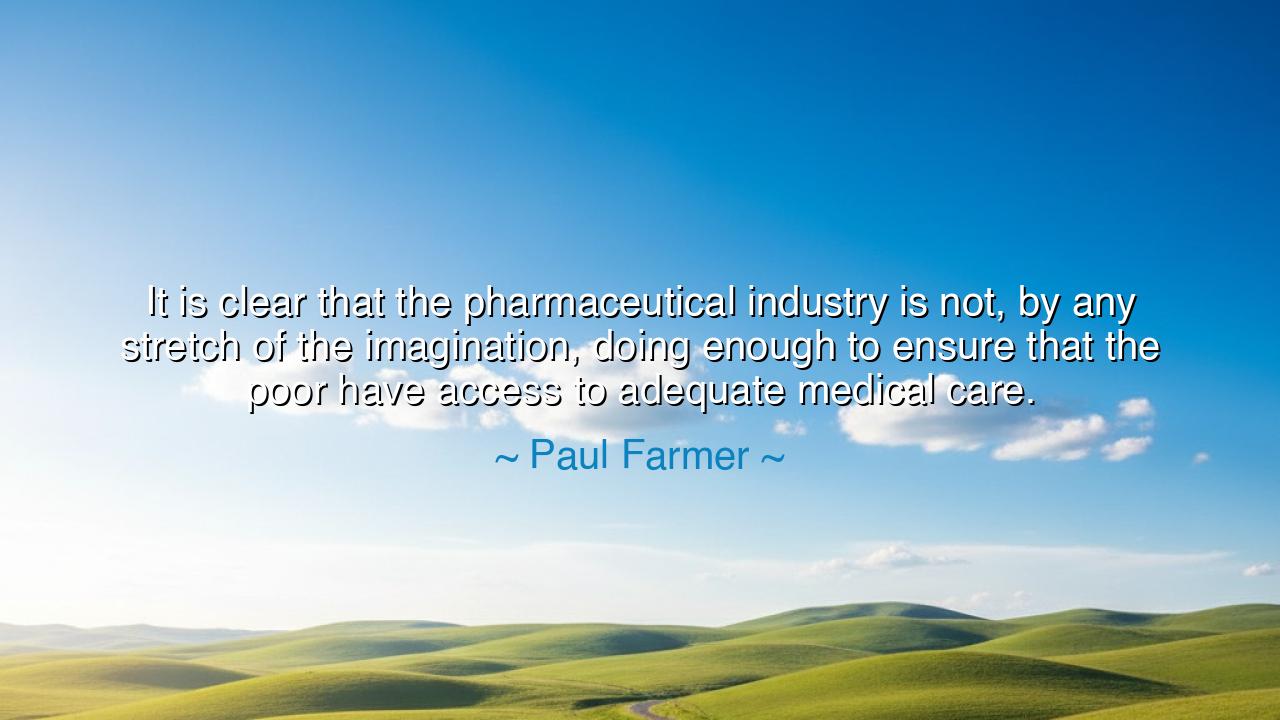
It is clear that the pharmaceutical industry is not, by any
It is clear that the pharmaceutical industry is not, by any stretch of the imagination, doing enough to ensure that the poor have access to adequate medical care.






Hear, O seekers of justice and mercy, the voice of Paul Farmer, physician to the forgotten and prophet to the poor: “It is clear that the pharmaceutical industry is not, by any stretch of the imagination, doing enough to ensure that the poor have access to adequate medical care.” These words, spoken from the trenches of human suffering, strike like a thunderclap against the walls of comfort. They remind us that healing is not only a science, but a moral duty, and that medicine, if hoarded by wealth, ceases to be medicine at all.
The origin of this declaration comes from Farmer’s own life of service among the destitute in Haiti, Peru, and Africa. He saw with his own eyes how diseases long defeated in wealthy lands still ravaged the bodies of the poor. He watched as children perished for want of antibiotics that cost less than a loaf of bread, while the world’s great pharmaceutical empires guarded their patents like fortresses of gold. His words are born not of theory, but of encounter—of holding the hands of the dying and knowing that their deaths were not fate, but the consequence of human neglect.
Consider the bitter irony he unveils. The world has advanced in miracles of medicine: vaccines that banish plagues, drugs that tame cancers, therapies that extend life itself. Yet these blessings, which ought to belong to all humankind, are distributed unevenly, like treasure locked away from those who need it most. Farmer’s words remind us that medical care becomes a privilege, rather than a birthright, when profit is placed above compassion. And in that distortion, civilization itself is diminished.
History offers us proof of both the failure and the possibility of change. In the early years of the HIV/AIDS crisis, life-saving drugs were priced so high that millions in Africa faced certain death. For years, the pharmaceutical industry resisted lowering costs. Yet activists, doctors, and ordinary citizens cried out for justice, and at last, the walls began to break. When generic medicines were allowed to spread, countless lives were spared. This story reveals both the cruelty of neglect and the triumph of persistence—it shows that access to medicine is not a dream, but a choice.
The deeper wisdom in Farmer’s words is that health is not a luxury but the foundation of human dignity. A society that permits the poor to die while medicine gathers dust on shelves has already wounded its own soul. To heal the sick is not charity; it is justice. To make medicine available to all is not generosity; it is the fulfillment of humanity’s most sacred duty. In this light, Farmer’s cry is not only against the industry, but against all who choose silence in the face of preventable suffering.
What lesson, then, shall we take? It is this: never accept that scarcity of compassion is inevitable. Do not believe that the suffering of the poor is the natural order of things. Demand accountability from those who hold power, wealth, and patents. Support organizations that bring care to the forgotten. And in your own life, act with the spirit of Farmer—see the poor not as distant shadows, but as neighbors, brothers, and sisters whose well-being is bound to your own.
Therefore, O listeners, let your actions be guided by this principle: health is a human right. Let no wall of profit, no boundary of nation, no excuse of cost deny the poor what is theirs by birth and by dignity. And remember always that when medicine is shared, life is extended, and when life is extended, hope itself is multiplied.
Thus let Farmer’s words endure: “The pharmaceutical industry is not doing enough to ensure that the poor have access to adequate medical care.” Take them not as accusation only, but as a summons to courage. For the healing of the world will not come from industry alone, but from the rising of countless hearts who believe that every life—rich or poor—is worthy of care, compassion, and love.






AAdministratorAdministrator
Welcome, honored guests. Please leave a comment, we will respond soon